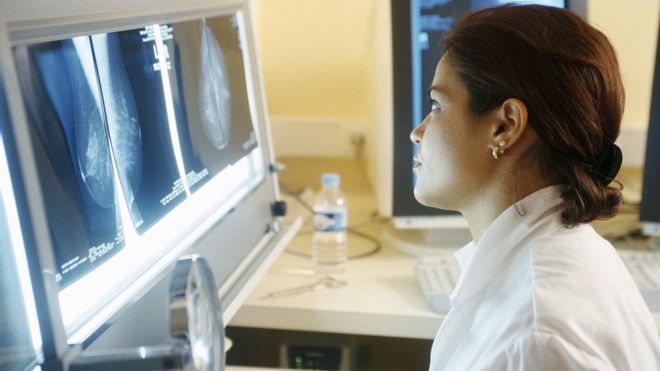

 The proportion of women in England taking up their initial invitation for breast cancer screening is at its lowest level in a decade, figures show.
The proportion of women in England taking up their initial invitation for breast cancer screening is at its lowest level in a decade, figures show.
The Health and Social Care Information Centre data showed the proportion of women aged 50-70 screened fell to 63.3% in 2014-15, from 70.1% in 2004-05.
Breast screening coverage – the overall number checked – has also fallen for the fourth year in a row.
Experts said the reasons for the falls needed to be urgently investigated.
Under the NHS Breast Screening Programme, women are usually invited for their first routine check between the ages of 50 and 53, then normally invited back every three years until the age of 70.
There are also pilots at most of England’s screening centres, where the age range invited for screening is being extended to those aged 47-49 and 71-73.
Overall, 2.11 million women were screened in 2014-15, from a total of 2.8 million who were invited.
Coverage of women aged 53 to 70 was 75.4% at 31 March 2015, down from a peak of 77.2% in 2011.
Cancer was more likely to be found among the older women screened.
Regular checks
Pritpal Rayat of HSCIC said: “These statistics show the falling proportion of women at the younger end of the programme’s target group who are being screened after they get their first invitation.”
Dr Anne Mackie, Public Health England’s director of screening, said: “It is encouraging that more than 75% of women are having regular breast screening. However, there has been a downward trend over the last four years.
“The fall in attendance is most notable in women receiving their first invitation and we are working hard with our NHS and community colleagues to understand why this might be and make the programme accessible to all women who wish to be screened.”
Eluned Hughes, head of public health and information at Breast Cancer Now, said: “The continued decline in the number of women taking up their first screening invitation is of real concern.
“There will be a complexity of reasons behind this trend and further investigation into these causes is now urgently required at a local level.
“Comprehensive evidence has shown that screening prevents deaths from breast cancer, but there are some small risks as well as benefits.
“Ultimately, the earlier breast cancer is picked up, the more likely treatment is to be successful. Whether they choose to attend screening or not, we’d encourage all women to check themselves regularly, to get to know how their breasts normally look and feel, and to report any unusual changes to their GP.”

